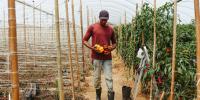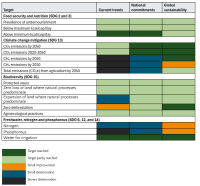The global food system burdens the climate, damage nature, and impacts our health

The new report shows that, on average, only 16% of the sustainability development goals (SDGs) are on track to be achieved by 2030 globally. The remaining 84% of the targets have seen only limited progress or even setbacks.
The food system in particular faces significant challenges in reaching the SDGs. This is because the food system is one of the world's largest sources of greenhouse gases and it expands at the expense of nature and biodiversity. Simultaneously, 600 million people are undernourished, while an increasing number are suffering from obesity due to unhealthy diets. All of these issues are addressed by the SDGs.
“There is a lot at stake because our food system is crucial for achieving global sustainability, and we still have a long way to go. We are facing a fundamental transformation of the food system. An obvious focus area is to produce more food on less land,” says Simone Højte, project manager at CONCITO.
The food system encompasses all processes related to agriculture, fisheries, food production, transport, retail, consumer preferences, diets, and waste management. Therefore, there are numerous levers to increase sustainability, though many initiatives emphasize transitioning our dietary habits and agricultural production.
CONCITO has contributed to the new UN report on the SDGs as part of the Food, Agriculture, Biodiversity, Land Use, and Energy (FABLE) consortium. The consortium comprises experts from 22 countries who have modeled the world’s food production and consumption up to 2050 based on three different pathways, assessing how far the global food system is from achieving the SDGs.
Unfortunately, none of the pathways in the report successfully model a globally sustainable food system that provides sufficient food for a growing global population while staying within Earth’s planetary boundaries.
“The report’s results show that we will only achieve a sustainable food system if we think outside the box. Regions currently consuming too little and unhealthily must eat more and better, while our region must consume far fewer animal products and less fat and sugar,” says Simone Højte, project manager at CONCITO.
The results underscore the urgent need for initiatives to achieve a global sustainable food system. These initiatives should contribute to three overarching goals: avoiding overconsumption and limiting the intake of animal proteins, increasing the productivity of food production, and ensuring more and better nature.
The actions required to achieve a sustainable food system vary by region. However, all countries and regions must make targeted efforts to ensure development in the same direction. For instance, a climate tax on agriculture is being discussed in Denmark as a key measure to reduce the climate impact of the agricultural sector.
“Some of the biggest potentials lie in increasing the productivity of both plant and livestock production among small-scale farmers in developing countries, while simultaneously ensuring better protection of existing nature. It is a complex equation to solve on a global scale, which is why multilateral processes ensuring the basic conditions are crucial,” says Simone Højte, project manager at CONCITO.
About FABLE
The report is published by UN’s Sustainable Development Solutions Network (SDSN) based on pathways developed by the FABLE model. The FABLE model is an international food and land use model designed to calculate consumption, environmental, and climate impacts on a global scale. CONCITO participates in SDSN’s FABLE model network and is responsible for delivering data about food consumption and production in Denmark. CONCITO also assists with the development of the FABLE model.
For further information, please contact:
Simone Højte, project manager, sih@concito.dk, 61 48 31 77
Ghita Borring, head of communication, gb@concito.dk, 93 88 18 19
CONCITO is Denmark’s green think tank. Our purpose it to contribute to reduced greenhouse gas emissions and limit the damaging effects of global warming. CONCITO means “I set in motion” in Latin, and that is what we aim to do in the climate field. We are one of Denmark’s largest green networks, with almost 100 companies, scientists, organizations, and civilians as our members.



